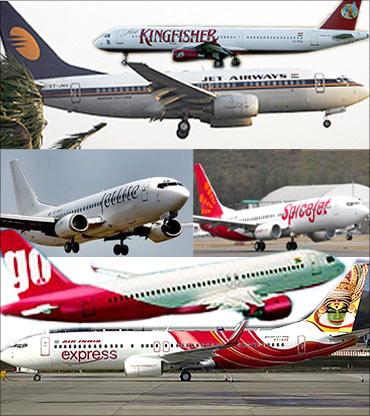
But when a top airline chief executive recently started signing nearly half the cheques issued by his company, he had no doubts about the CFO's ability or integrity.
In fact, he was trying to evaluate every area of operations, however small, questioning every aspect of the established procedures and looking for better and more efficient ways of doing things - with an eye on minimising costs.
...
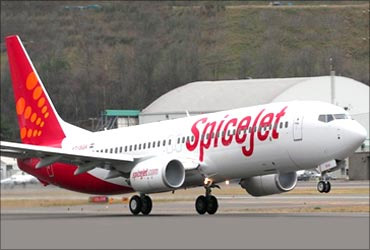
With fuel bill accounting for 50 per cent of operating cost, and lease rentals and staff cost making up another 20 per cent, struggling Indian airlines like SpiceJet, Kingfisher and Jet Airways are left with little choice but to pinch every penny to somehow keep business solvent, even as they await policy clearance that may allow foreign airlines to pick up stake and inject the much needed cash.
SpiceJet and Jet Airways, which reported profits in the first quarter of 2010-11, posted losses of Rs 72 crore (Rs 720 million) and Rs 123 crore (Rs 1.23 billion), respectively, during the same period this financial year.
...
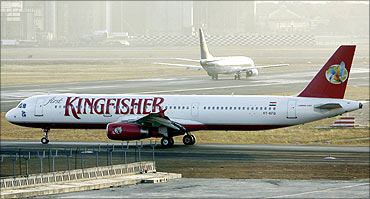
Kingfisher Airlines' losses in the first quarter of this financial year widened to Rs 263.5 crore (Rs 2.63 billion), from Rs 187 crore (Rs 1.87 billion).
However, IndiGo ended the last financial year with a profit of Rs 650 crore (Rs 6.5 billion).
Amid surging oil prices, depreciating rupee, cut-throat competition, threats of another slowdown, these airlines are combing through every little nook and cranny to cut fat and maximise ancillary revenue - starting from reducing quantities of brochures printed and doing away with disposable coffee cups to taking the green routes to save aviation turbine fuel and generating revenue from advertisements on boarding passes, baggage tags and on in-flight entertainment channels, and fees from excess baggage.
...
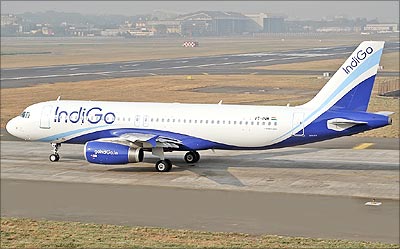
"We cannot do much about our major concerns of high fuel prices, depreciating rupee and artificial low ticket prices. We are trying our best to bring down other costs," says SpiceJet chief executive officer Neil Mills.
By efficiently operating aircraft, airlines claim they are able to save two per cent of their fuel cost.
"Things like not taking the plane to high altitude, taxing the aircraft with only one engine and cleaning the plane with limited helps are saving around two per cent of the fuel cost," says an executive of another low-cost carrier.
...

Airlines can also save on fuel costs by paying dues to oil marketing companies on time, which fetches a discount of 10-15 per cent.
However, Air India and Kingfisher Airlines cannot avail this discount because they owe money to OMCs.
These oil firms had recently stopped fuel supplies to the two airlines after they repeatedly failed to clear pending bills.
In terms of cost of operation, the Indian aviation market is one of the most expensive in the world.
That's largely because of high levies on the aviation turbine fuel and high airport charges, especially after private players started operating them.
...
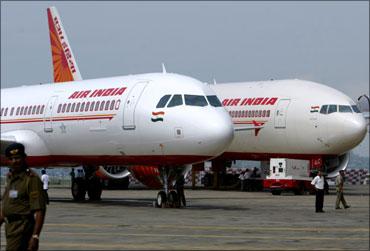
The average tax on jet fuel in India is 24 per cent, second only to Bangladesh (at 27 per cent) in the world, making the fuel cost half of the operating cost.
Also, jet fuel prices have increased by 40 per cent in the past year.
India is also one of the fastest growing aviation markets.
It has witnessed passenger growth of around 20 per cent that is among the largest in the world. Six major Indian carriers with around 400 aircraft catered to 143 million passengers, including 38 million international, in 2010-11.
Indian carriers flew 35 per cent of the international passengers in 2010-11.
...
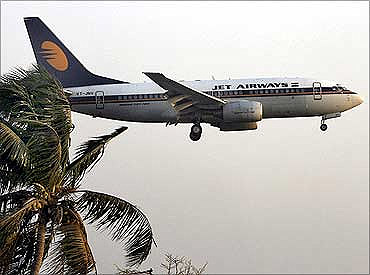
A depreciating rupee against the dollar has rubbed salt into the wound, as more than a third (35 per cent) of the operating cost of an airline is calculated in dollar terms.
The rupee has declined by more than 10 per cent this year, thus increasing dollar-denominated expenditure by a similar amount.
Lease rentals and maintenance rentals of aircraft, salaries paid to expatriate pilots, parking and landing rates at international airports and jet fuel prices are all dollar-denominated costs.
Airlines are trying every trick to trim costs, like renegotiating contracts with suppliers for discounts.
...
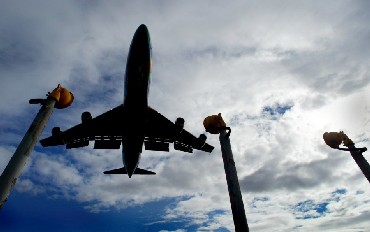
"We keep negotiating with our various vendors ensuring that every time there is some cost benefit without compromising on the quality," said a senior executive of a full-service carrier.
He, however, claimed there was no compromise on the quantity or quality of the food served on board.
"The domestic sector has only 35 per cent of its capacity in full service and they are in the routes with demand for that. And, if we compromise on that, there is a risk of losing the customer," the executive added.
For a carrier with international operations, expense on food makes up three to four per cent of its total operational cost.
...
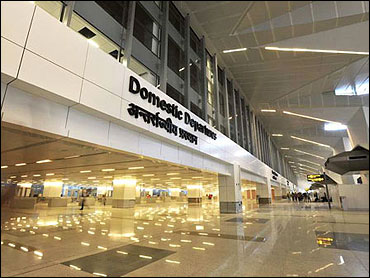
"After renegotiations, we are able to bring down this cost by 0.5 per cent," the executive said.
Airlines have automated some of their functions to make the system more efficient and control cost.
"Automation things like Kiosk checking, pre-purchase of meals through website and inventory management have helped us increase our efficiency and also save costs," said another airline executive. Airlines' fiscal woes have been compounded by exorbitant airport charges.
The operators of Delhi and Mumbai airports have sought a 500 per cent increase in parking and landing charges.
Airlines claim some charges at these airports have already been increased by as much as 300 per cent.
...
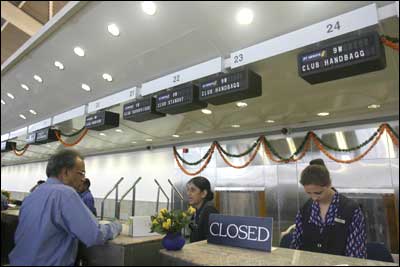
"These airport operators have already increased rents and are also earning a lot through the shopping space they have at all these new terminals. Why do they still need a hike?" said the executive.
However, analysts feel the problems, apart from the high oil price, that the airlines are facing is not grave and can be overcome by doing little things efficiently.
"Even as the scenario for everyone is same, there are airlines that are making profits. There are problems, but the airlines can overcome those by increasing efficiency. They can improve their on-time performance, increase fleet utilisation by improving their turnaround time and increasing employee efficiency," said Amrit Pandurangi, senior director, Deloitte Touche Tohmatsu.